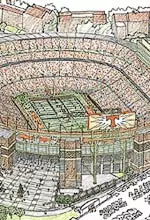University of Tennessee Athletics

Tennessee Announces Long-Term Plan for Neyland Stadium
November 09, 2004 | Football
Nov. 9, 2004
The University of Tennessee Athletics Department (UTAD) unveiled its master plan for Neyland Stadium Tuesday. The master plan was commissioned in the spring to serve as a long-term solution to issues currently facing Neyland Stadium and prepare the stadium for the next 75 years.
"When beginning the research and design for Neyland Stadium, we took into account the heritage of Tennessee football to distinguish our top priorities," said Mike Hamilton, men's athletics director. "We wanted to maintain the collegiate integrity of the stadium, take a fiscally responsible approach to renovations, improve and modernize concourses, bathrooms and concession areas for all UT fans, provide infrastructure for basic amenities, and enhance safety while addressing the ADA compliance issues currently facing the stadium."
Renovations will be completed in five phases beginning after the 2005 football schedule during the off-seasons to reduce inconveniences on fans. The renovations should take approximately eight to 12 years to complete, provided funding is available.
Before beginning the master plan, UTAD visited six stadiums across the country that are similar in age to Neyland. The department also received feedback from more than 3,000 fans through an online survey.
The long-term master plan will improve the Neyland Stadium experience for all fans while enhancing safety and security. The improvements include:
- Renovation and widening of concourse areas to assist in traffic flow and make fans' experience more enjoyable
- Addition of family restrooms
- Increase in the current number of women's restroom facilities by almost 300 percent
- Addition of concession stands
- Creation of entry plazas
- Addition of club seats
- Update of the infrastructure for water, electric and sewer systems
"Neyland Stadium has served the University of Tennessee and the state well over the past 83 years," University of Tennessee President Dr. John Petersen said. "Mike Hamilton and his staff have put together a plan that will modernize and upgrade a facility that will serve us as well in the future as it has in the past."
The master plan was created in a phased approach. Each phase is independent to ensure that funding is available for each phase before it begins.
One key goal of the master plan was to find a way to fund the renovations without financially impacting all Tennessee fans. Several specific revenue streams were designated to fund the future of Neyland Stadium and the continuance of Tennessee's prominence on the national stage.
Funding sources for the estimated $107 million project include philanthropic gifts and bonds to be serviced by a combination of annual athletics department revenues. The addition of club seating will be a major funding source for the renovations, providing more than $34 million in private gifts and over $3 million in annual revenue toward improvements. Funds generated from the 2004 sideline seating policy change also will be used for the renovations.












